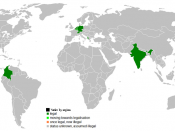When most people think of euthanasia, they think merely of death. Death usually has a negative connotation to it, although at times it may be beneficial. The word "euthanasia" comes from the Greek word "thanatos," meaning death, and the prefix "eu," meaning well or easily. It can be defined as a gentle or easy death. As Encyclopedia Britannica defines it, euthanasia is "the act or practice of painlessly putting to death persons suffering from incurable conditions of diseases." This "easy death" is often criticized by people whose ideas are shaped by religion, the media, and misinformation. It should be a basic human right for individuals to decide whether they want to continue their life or end it.
It is important to gain a better understanding of what actually constitutes the act of euthanasia. There are two different types of euthanasia, active and passive. Active euthanasia gives the individual the choice of when to die (with the help of someone else), for example, by a lethal injection.
Passive euthanasia leads mainly to a natural death, in the sense that there is no attempt to keep the patient alive by, for example, surgery or the use of medication.
With the process of euthanasia, a great deal of suffering can be eliminated. If the individual chooses to die by euthanasia, they would have an easier, better death, without pain, which is better than a life of torture. If one is not able to enjoy their life, then they should not be forced to live it. Unhappiness does not constitute the quality of life. Euthanasia may also eliminate family suffering. The pain that family feels watching a loved one suffer is just as great as the pain felt by the patient. There are also the economic issues to consider. The longer a patient is...



Excellent
Not only does it explore both sides, but takes a logical stand. A suggestion would be to look at both sides more in depth. However, still an excellent essay!
4 out of 4 people found this comment useful.